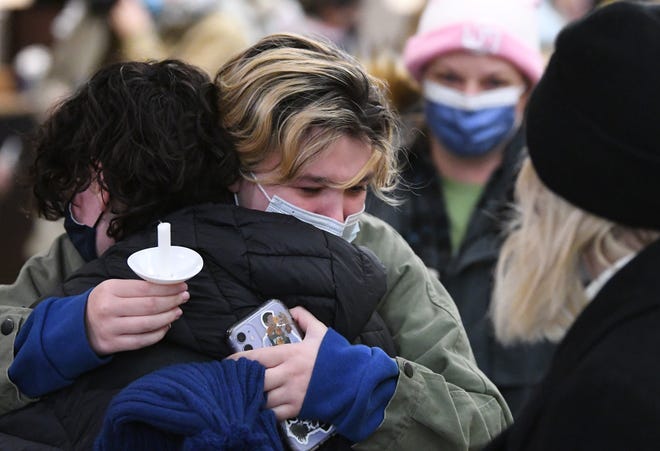How parents can help students cope with Oxford school shooting
 Karen Bouffard
Karen BouffardThe shootings at Oxford High School that killed three students and injured at least eight others on Tuesday will have deep psychological effects on children, but adults can help students cope by providing emotional support, mental health experts say.
The advice applies to students who were at Oxford High School and others in the community who have been affected by the news, experts say.
"It would be very important for parents to just be observant of things such as changes in sleep and appetite, changes in behavior, or children having trouble focusing or concentrating," said Dr. Hema Iyer, chief medical director at Henry Ford Kingswood Hospital in Ferndale, a psychiatric facility for both children and adults.
"The most important thing an adult can do for a child is just to be fully present — to be physically, emotionally and mentally present for the child, and to let them know that they are in a safe place."
The Oakland Community Health Network released numbers for people to call for mental health support. The Oakland County 24-hour Crisis Helpline is at (800) 231-1127. Individuals also can call or text (844) 446-4225 for the Michigan Crisis and Access Line.
Students are likely to experience some trauma-related symptoms, said Lyndsay Volpe-Bertram, a clinical psychologist with Spectrum Health in Grand Rapids, a 14-hospital health system that includes Helen DeVos Children's hospital.
"It could be things like a sense of decreased safety in their environment, fear and worry about something else happening," Volpe-Bertram said. "It could be having intrusive thoughts and remembering specific details and sensory information about what has happened — probably a lot of fear and nervousness about their environment."

Students could also have physical symptoms such as headaches or stomachaches, or feel nervous or shaky, she said.
"It's a horrible thing, but their veil of safety has been ripped off," Volpe-Bertram said. "When something like this happens, it inserts itself into our lives as 'Now this is something that could happen to me, to my friends, in my school."
Adults also are affected — from teachers to parents to first responders to others in the community. And adults may suffer many of the same symptoms experienced by students, the experts noted.
"I worked with teachers before, and their sense is not only, how will I protect myself in this situation, but how will I protect my students?" Volpe-Bertram said. "It can be incredibly overwhelming, so I would anticipate that they would have a very similar trauma-related response to the students."
Parents can help by being candid about what happened and allowing their children to express what they're feeling, she said. If students don't want to talk, parents should check in with them periodically over the next days or weeks to invite them to share what they're experiencing, she added.
Parents who are struggling with their own emotions should reach out to other adults for support, Volpe-Bertram added.
"We don't want to pretend everything's OK, but we also don't want to overwhelm our kids with our experience," she said. "It's that balance of talking to another adult about it, but also being candid with the kid about the experience and how we're concerned about them."
Kingswood Hospital's Iyer said many children come through traumatic experiences without long-term negative effects.
"They are resilient, young human beings," Iyer said. "The majority of children come through such tragedies being relatively psychologically well.
"But at the same token, children are actively developing and growing during this phase of their life ... and there is definitely some reason to be concerned that trauma at a very young age can affect how children view the world, from a psychological perspective, and how it affects their ability to handle stress and anxiety."
According to Iyer, it is helpful for parents to limit the amount of time children spend watching the news, talking about what happened or visually reliving the event on their phones or other devices
It's also important to maintain a sense of normalcy as much as possible, she said.
"Make sure they have the added support," Iyer said. "Make sure the children feel safe and secure, while also finding a way to help them reintegrate back to their regular routine."
The Oakland County Community Health Network on Tuesday published the following tips for parents:
- Acknowledge what happened. Provide age-appropriate information and be supportive.
- Ask older children who may have seen news coverage what they know about what happened and how they feel about it.
- Recognize the effect the event had on your child; validate their feelings and concerns.
- Return to a normal routine as soon as possible to help children feel safe and secure.
kbouffard@detroitnews.com
Twitter: @kbouffardDN